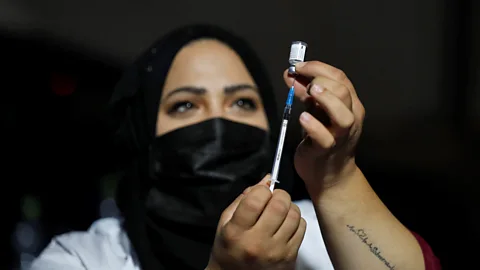Covid-19: How effective is a third vaccine dose?
 Getty Images
Getty ImagesFrom squandering global vaccine supplies to the possibility of undermining immunity from the first two doses, booster programmes are a surprisingly complicated business.
The turning point came just after 6:30 on a Tuesday morning.
It was the 9 December 2020 and 91-year-old Margaret Keenan and 81-year-old William Shakespeare – who delighted the world by hailing from Warwickshire, like the poet – had just become the first people to ever receive an initial dose of a Covid-19 vaccine outside clinical trials.
The entire room burst into applause. The day was named "V-day", and the atmosphere was giddy. One British newspaper celebrated with the whimsical headline "The taming of the flu" – while footage of a particularly charismatic early vaccine recipient, who was more concerned about his "rather nasty lunch" than the needle went viral on Twitter. The pandemic was far from over, but this was the first step on the way out.
Nine months later, around 5.7 billion doses of various vaccines have now been istered worldwide – with 41.8% of the global population at least partially protected. But the list of unknowns is growing by the day.
"One ghastly thing about this pandemic is that people get cross with us [scientists]," says Danny Altmann, professor of immunology at University College London, "because we change our minds, because it's such a moving target."
Now that it's clear the world is likely to be riddled with Covid-19 – and its many variant successors – for years to come, the next big question is whether two doses of each vaccine is enough.
Altmann explains that not that long ago – in April and May – he was writing articles and giving interviews saying that most vaccinated people had immunity that was so stupendous, there was no need to worry about booster doses.
"The expression I used was 'protective headroom'," says Altmann. "That you've got lots of protective headroom and even if variants come along that drop the effectiveness of your vaccine 10 times, say, because you've got a 1,000 times excess of antibodies, it wouldn't do any harm." The strong antibody response was initially reflected in their efficacy, too – while the World Health Organization (WHO) recommended approving any over 50%, in reality it was orders of magnitude higher.
Then the Delta variant came rampaging – and though most people still have high levels of antibodies, breakthrough infections are not rare events. "We're seeing breakthrough infections in the face of quite decent levels of neutralising antibodies," he says.
 Alamy
AlamyBut are we likely to start seeing significant numbers of deaths? How effective are booster doses anyway – and what's the best way to ister them? From radically diverging immunity in different groups of people to the – small – hypothetical possibility that third doses of certain vaccines could actually decrease the amount of immunity we have, there are many scientific reasons that booster programmes are a very different endeavour to the initial vaccine rollout.
"At the beginning, it was very simple concepts – do we test or don't we? Do we have antibodies, or don't we">window._taboola = window._taboola || []; _taboola.push({ mode: 'alternating-thumbnails-a', container: 'taboola-below-article', placement: 'Below Article', target_type: 'mix' });

